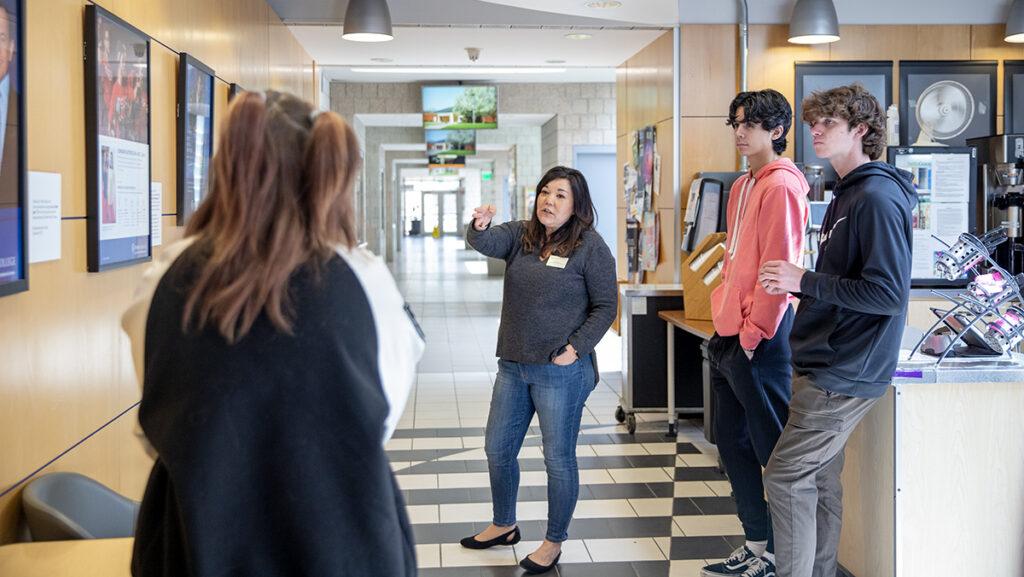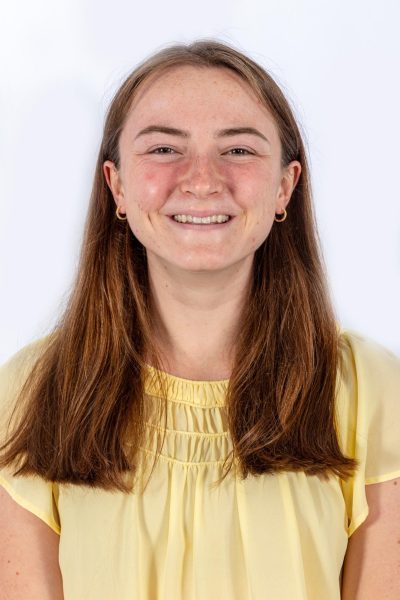In Fall 2023, Ithaca College will test a pilot program in which all incoming students’ courses will be selected by college faculty based on a comprehensive academic interests survey.
Elizabeth Bleicher, dean for Student Success and Retention, said via email that the college will post a survey for incoming students on the New Student Checklist on May 1 to collect information about subject areas, issues and themes that interest them. Bleicher said each school’s academic services coordinators and assistant and associate deans will work with staff from the Center for Student Success to build balanced schedules for students based on their major and preferences indicated on the survey.
Bleicher said the college is implementing the pilot program because it hopes to reduce incoming students’ stress and increase their likelihood for success in their first semester and year at the college.
The third semester retention in 2022 was 83%, meaning that 83% of first-year students who enrolled at the college in Fall 2021 returned for their second year, according to the Office of Analytics and Institutional Research. The third semester retention rate was 83% in 2021 and 84% in 2020. The college and the Board of Trustees are working to increase the college’s enrollment and retention rates.
“In the past, students and their supporters regularly reported that having to complete all the online modules and then register for courses was stressful and led to dissatisfying results,” Bleicher said. “We researched how other schools conduct academic onboarding for new students. We learned that students are most successful when professionals establish their fall course foundation, and happiest when that foundation is not set in stone but has a bit of room for adjustment.”
Bleicher said most high school students do not have experience with constructing their own academic curriculum, and advising professionals are better equipped to build balanced schedules that reflect students’ interests and degree requirements.
Bleicher said she hopes selecting courses for students will allow them to refocus their mental energy on other tasks to prepare for their first semester, like the New Student Checklist or IC Advantage courses, one-credit introductory courses offered during the summer to help new students transition to college.
Kristin Morse, academic services coordinator for the Roy H. Park School of Communications, said the college is still working out several details in the first year course selection process. Morse said the students in the Park School have always been pre-registered for courses in their major.
“I think it’s going to be a great way to streamline the process for students who are transitioning from high school to college, which is a huge transition in itself,” Morse said. “I think, for the majority of students coming in, it’s going to be nice that they, they have the assurance that we know what classes they have to take, and we’ve already taken care of that.”
Morse said the pilot program will help incoming first-years with the stress of college.
“We’ll be able to place them in classes that most likely they would have placed themselves into anyways,” Morse said. “But [through the survey] they don’t have to learn HomerConnect over the summer when they’re trying to do prom, graduate … it will take a little bit of pressure off of the things that they need to do for the summer.”
Morse said she wants students to know that while schedules may or may not be subject to change in the fall, they will have support when they arrive at the college.
“I think it’s important that if they’re concerned or anything like that, that they’re going to have the opportunity to talk to people about those concerns,” Morse said. “And if it’s concerns that need a change of schedule, we’re all here to make sure that they get what they need.”
The college tested selecting courses for incoming students with the incoming exploratory students in Fall 2022. The college sent a survey to exploratory students with questions about their interests and prospective majors and sent them schedules in summer 2022. Bleicher said that almost every incoming first-year exploratory student filled it out. Bleicher said in 2020, incoming first-year students registered for courses themselves after going through an online module about the process.
“The response was overwhelmingly positive from incoming EXPL students and their supporters,” Bleicher said. “We also checked on whether students threw out the schedule we built for them personally, and many changed a single course or a course section, but few if any scrapped it and built their own.”
First-year student Ian Shay, an exploratory major, said he was initially skeptical of the schedule that he received. Shay indicated that he was interested in photography on the survey, as he was considering a Film, Photography and Visual Arts major.
“I wanted to add photography because it was something that … I was really passionate about,” Shay said. “I was a bit intrigued when that didn’t come up [on the schedule]. … I just got the schedule that they made, which had a class in the Park School — not necessarily one where you’re creating content of any kind. However, it still got me in the school and gave me a vibe.”
Shay said he was also wary of one of the courses on his schedule, Understanding Disability, because he did not believe it was connected to his prospective majors or interests. However, he is grateful that the college selected a course beyond his indicated interests and allowed him to explore a new subject area.
“[One of] the other classes that I was, not really sure what purpose they were serving originally turned out to be one of my favorite classes in college so far,” Shay said. “That class had prompted a lot of thought with other majors for me to possibly choose, which led me to take Intro to Occupational Science.”
Incoming first-year student Serenity Angrand said she is used to having her courses selected for her, as her core classes were scheduled for her in high school. Angrand said she trusts the college to select courses for her.
“My school knows what’s best for me I think, based on what I’m trying to get after major-wise,” Angrand said. “I honestly feel less stressed because I feel like if I was to pick [courses] … without doing my research, I could pick a class that wouldn’t even have the right amount of credits to get me where I need to be on time.”
Prospective student Shane Buoye said that if he commits to the college, he would be nervous that the college would choose courses for him that he would not find interesting.
“I would want to have a little bit of decision making so that I would have the courses that I want,” Buoye said. “But … I think one of the biggest parts is mental health. So if it decreases stress, I think it’s a better option even if you don’t get to pick your college courses.”
Bleicher said students who complete the math placement assessment and survey on time will receive their schedules by Aug. 1. The college will send reminders via email and text to students who have not completed the survey. If students cannot access the Internet to complete the survey, the college will build a schedule for them based on their major and ICC requirements. All students can adjust their schedules once they arrive on campus and meet with academic advisers.
Shay said he discussed his assigned schedule with Maria DiFrancesco, professor in the department of World Languages, Literatures and Cultures and director of the Exploratory Program. Shay said speaking with DiFrancesco reassured him that the college understood his interests and selected appropriate classes for him.
“Someone else’s view of you might be more clear than your own just because you have so much going on in your life at that time of beginning college,” Shay said. “If your courses are selected in a way that you’re not comfortable with, feel free to … talk to people, like administration, people that can get your schedule sorted out as best they can or tell you why they selected the courses they did.”









